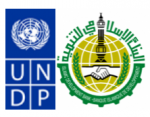On the margins of the 71st session of the UN General Assembly (UNGA 71), the Islamic Development Bank (IsDB) and the UN Development Programme (UNDP) held an event on Islamic finance and impact investing, and their contributions for implementing the Sustainable Development Goals (SDGs).
 20 September 2016: On the margins of the 71st session of the UN General Assembly (UNGA 71), the Islamic Development Bank (IsDB) and the UN Development Programme (UNDP) held an event on Islamic finance and impact investing, and their contributions for implementing the Sustainable Development Goals (SDGs).
20 September 2016: On the margins of the 71st session of the UN General Assembly (UNGA 71), the Islamic Development Bank (IsDB) and the UN Development Programme (UNDP) held an event on Islamic finance and impact investing, and their contributions for implementing the Sustainable Development Goals (SDGs).
Titled ‘Islamic Finance and Impact Investing for the SDGs: the Way Forward,’ the meeting served to follow up on a joint IsDB-UNDP side event that took place on 26 September 2015, on the role of Islamic Finance in implementing the SDGs. Sayed Aqa, IDB, informed participants that following the 2015 meeting, UNDP and IsDB signed a formal partnership agreement to support the implementation of the SDGs.
Kabir Hassan, University of New Orleans, said Islamic finance is growing fast and includes, as underlying principles, financial stability, financial inclusion, and reducing vulnerability. Mahmoud Mohieldin, World Bank Group , noted that Islamic finance: is a pro-development financial system; supports a number of sustainable development objectives, and could benefit the water, energy and education sectors in particular; and is implemented as part of the World Bank Group by the World Bank, the International Finance Corporation and the Multilateral Investment Guarantee Agency (MIGA).
Participants also discussed impact investing, which can be defined as investments that generate a measurable and beneficial social or environmental impact alongside a financial return on investment. Hassan remarked that Islamic finance shares similarities with impact investing, as both are governed by morals and beliefs, are fast-growing financial sectors, and aim to balance returns and social change. Tarek Mansour, PricewaterhouseCoopers (PwC), noted that both Islamic finance and impact investing are sources of unconventional financing, and aim to promote good ethical and social values, such as a fair distribution of wealth and social justice.
Noting that Islamic finance is available to everyone, not only to Muslims, Alfiya Salikhova, Astana International Financial Centre (AIFC), remarked that the AIFC – a financial hub for Central Asia, the Caucasus, the Eurasian Economic Union, the Middle East, West China, Mongolia and Europe – aims to become a regional hub for Islamic finance. She added that Kazakhstan used Islamic finance in its agricultural sector.
Ahmed Fayed Al-Gebali, IsDB, reported that the Global Islamic Finance and Impact Investing Platform (GIFIIP), led by IsDB and UNDP’s Istanbul International Center for Private Sector in Development (IICPSD), seeks to position Islamic finance and impact investing as a leading enabler of global SDG implementation through private sector engagement. According to a brochure prepared by IsDB and UNDP on the initiative, the platform seeks to connect Islamic financiers with impact investors and impact enterprises and to drive “innovative business solutions” to help address sustainable development challenges.
Sophie de Caen, UNDP, reported that 95 of the 131 UN Country Teams (UNCTs) around the world have been requested by their host governments to provide support to countries on SDG implementation. She said the development financing landscape is more diversified now than in recent years, and qualified Islamic finance is a promising way of financing the SDGs.
During the ensuing discussion with the floor, GIZ noted that the International Partnership on Religion and Sustainable Development was launched in Berlin earlier in 2016. The Partnership brings together bilateral donor countries, multilateral development agencies and civil society organizations to harness the positive impact of religion in sustainable development and humanitarian assistance. Participants also discussed cross-border financing and the importance of political will for Islamic finance implementation, among other topics. [GIFIIP Brochure] [UNDP-IsDB Memorandum of Understanding to Support the SDGs] [IISD RS Sources]